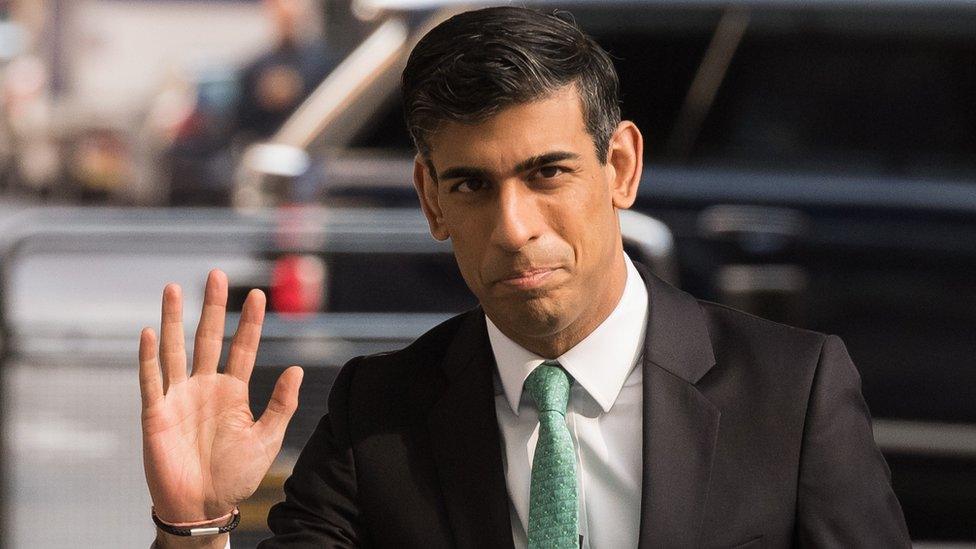Laura Kuenssberg: What do voters think of party leaders? Not a lot
- Published
Watch: Voters from areas that flipped from Labour to Conservative share their thoughts on Rishi Sunak and Keir Starmer
'We're not allowed to swear, are we?"
Both Conservative and Labour politicians might have muttered a curse or two if they had been in the room on Wednesday in Manchester, when we invited nearly 50 voters to share what was on their minds.
We did encourage them not to swear, as we will be showing their conversations on BBC One on Sunday. But the sentiments were strong.
Our groups were upset and frustrated about the state of the country, which was "in crisis", "depressing" and "dishonest and messed up".
And they did not spare the feelings of Prime Minister Rishi Sunak or Labour leader Sir Keir Starmer.
"Incompetent cretin", "dull" and " "not strong enough" was how some put it. Read on to find who was the target of which hurled insults.
For months, the polls, external have shown Labour convincingly ahead - with some surveys pointing to a massive majority.
In Westminster, fewer and fewer Conservatives seem to believe they have a chance to turn things around. There was even a botched attempt to dethrone Mr Sunak as prime minister this week.
But that is Westminster - we wanted to hear what is actually going on in the public's minds.
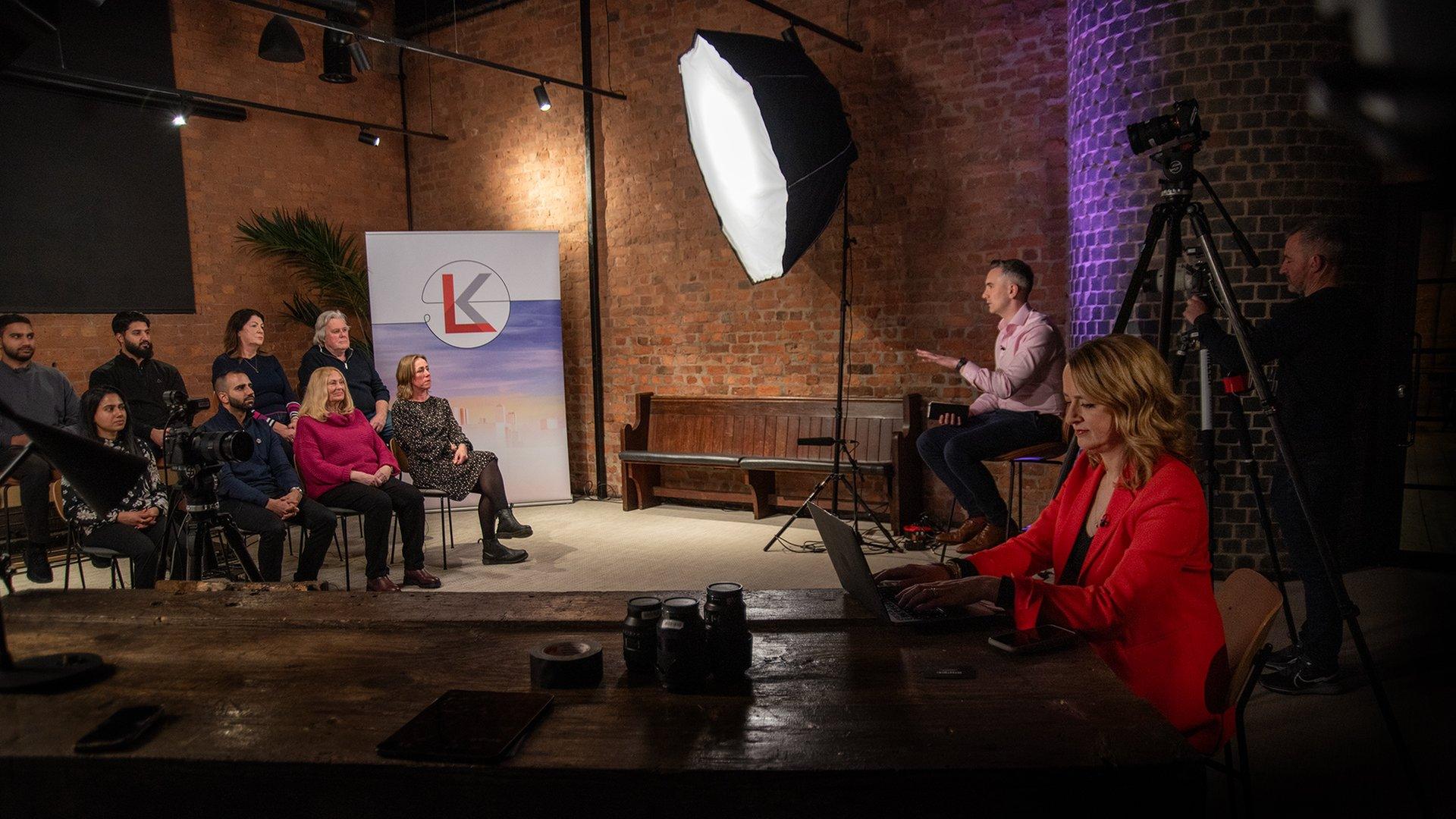
Nearly 50 voters spoke to us about their views on the state of the UK
So, with the help of the research group More In Common, external, we invited nearly 50 members of the public to come and share their views.
They all came from former Labour seats in the north west of England that were turned blue by Boris Johnson's Conservatives in 2019.
They were carefully selected to give a range of views from different political tribes:
Loyal Conservatives
Loyal Labour voters
People who voted Conservative last time but have decided to switch their votes to Labour
Those voting for the first time this year, and voters interested in the smaller parties, such as the Liberal Democrats or Greens
Those thinking about voting for Reform UK (the party Nigel Farage is president of)
And a last group, crucial for Rishi Sunak - voters who backed the Tories in 2019 but are undecided now
Our conversations, of course, do not give us a scientific report on the exact state of public opinion.
But we saw a snapshot of Britain in a Room, hearing from diverse voters - young, old, well-off, and struggling.
You can read how the participants were chosen here, external.
If you are of a nervous disposition, maybe look away now.
We discovered a deep pessimism about the state of the country - just one person saw optimism for 2024.
The top reason for the gloom? The huge increases in the cost of living.
Inflation may have eased off, but everyone we heard from has been feeling the pinch.
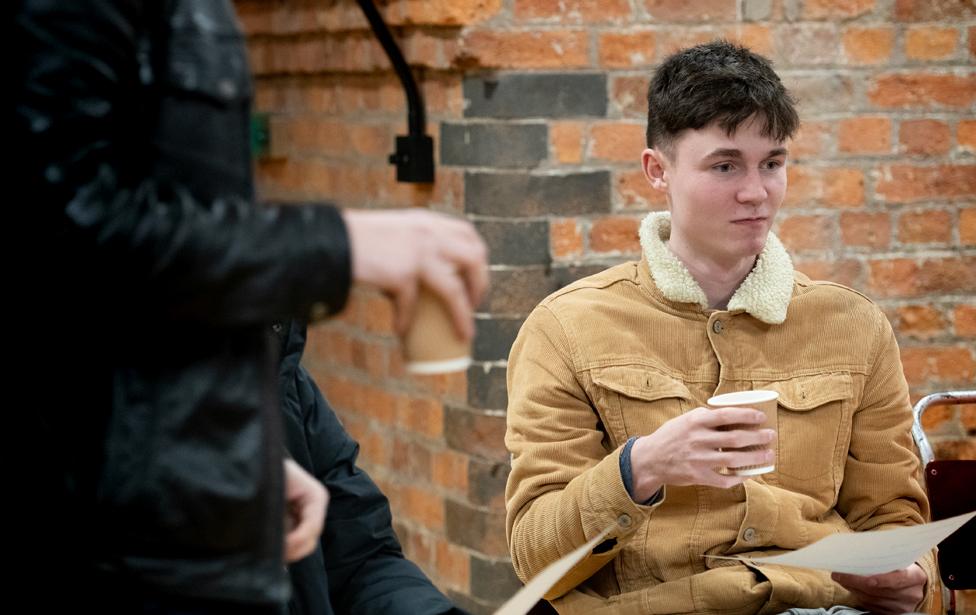
James, a student, was one of many struggling with the cost of living
James, a student, told us that some weeks he can hardly afford to eat. Jean, an NHS worker, has been working nights and taking on extra shifts. Pensioner Barry's fixed income is being stretched and stretched.
Nearly everyone had a horror story about the NHS too.
Carer Amy told us of "ridiculous" ambulance waits when those she looks after need help.
Michael, a dad of six with a heart condition, has been waiting more than six months for treatment.

On this week's show are Business Secretary Kemi Badenoch and Labour's shadow business secretary Jonathan Reynolds, along with Carlos Del Toro, US Secretary of the Navy
Watch live on BBC One and iPlayer from 09:00 GMT on Sunday
Follow latest updates in text and video on the BBC News website from 08:00

Jean claims there are not even enough basic supplies like paper towels or toilet paper at the mental health unit she works on.
Creating optimism or political excitement in this kind of atmosphere will be a tall order.
It is important to say there are some better signs from the economy - which was tentatively growing when the last set of figures were released.
Optimistic Tories are hoping this becomes a trend. But that sentiment had not reached our assembled voters this week.
What, then, did they make of those vying for their votes?
Even among loyal Tory voters, hardly anyone in our group believed that Mr Sunak was doing a good job - or even has the right set of skills to sort out the country's problems.
Our panels repeatedly mentioned the prime minister's family wealth, branding him out of touch and unable to get anything done.
First time voter James, who is planning to vote Green, labels him an "incompetent cretin".
"It's like he's reading from a script when he talks," Lib Dem-supporting Rebecca said.
While Reform UK voter Tracy thinks Mr Sunak has "no personality".
Voters have also taken notice of the Conservative in-fighting.
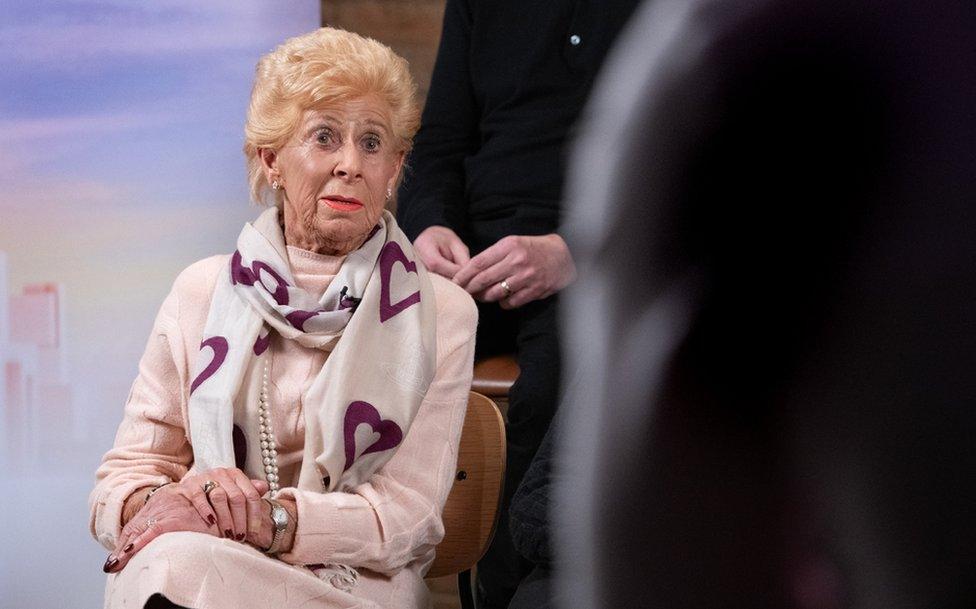
Sheila said there was "fighting and bickering" within the Conservative party
"No wonder he can't get anything done, because there's fighting and bickering," Tory voter Sheila said.
"I've never known a party like it, ever," she added.
If there is any good news for Mr Sunak, it's that several voters admired his work as chancellor. Conservative-voting Michael said he'd done a "marvellous job" before becoming the prime minister.
There was a consensus among every group that the prime minister's task is almost impossible. And Mr Sunak might not be the right person to do it.
You can watch more of what they said here, and hear more about why they reached those conclusions on Sunday at 09.00 GMT on the show.
But what about the leader who polls predict will be the next resident of No 10?
According to our groups, Labour's lead is not out of love for Sir Keir, or even party policy.
Undecided young student teacher Jonny said: "I don't know what he actually believes, I think everything he says is to try and win the majority over."
Ian, who plans to vote Labour, told us he would prefer "somebody that was either here or there, not somewhere in between".
Debra, a business owner who is undecided about how to vote, said: 'I don't look at him and think, he's the one that's going to come and save us."
Voters also still fear a comeback from Jeremy Corbyn's team, despite four years out of power. "Who'd be in his Cabinet, that's my fear," said Steven, a barrister who's intending to vote for Reform UK.
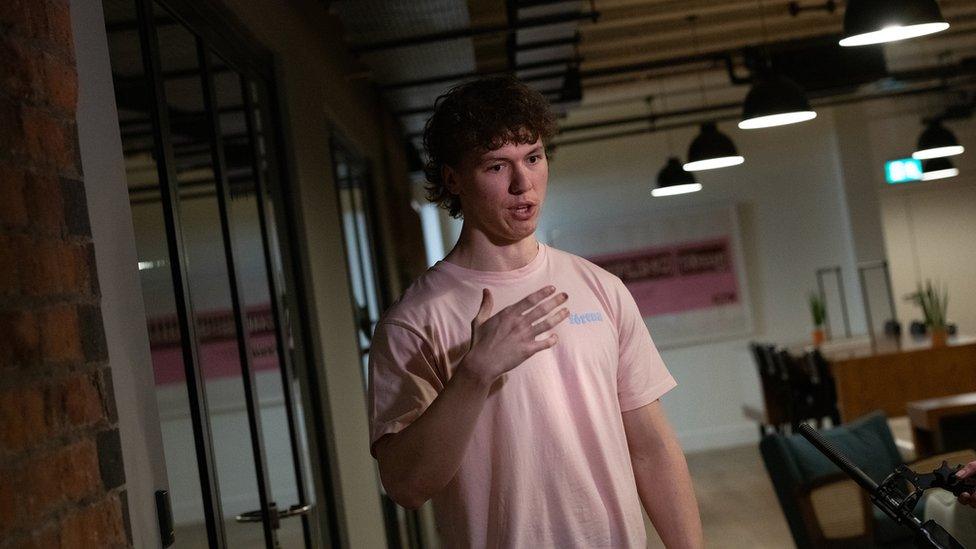
Undecided voter Jonny found Sir Keir Starmer insincere
There was some good news for Sir Keir. Karen, a switcher from Conservative to Labour, said she liked him - "I think he has got integrity".
But the sense from our sample was that Sir Keir is ahead by default. "The lesser of two evils," was a phrase used by several of our panellists.
The mood in the room did not indicate that Labour is in any way heading for an enthusiastic victory - more a grudging win.
Our groups were chosen carefully, but this is not a science. All the answers should be taken with a heavy pinch of salt.
We have seen a meaningful snapshot of how the public are thinking. We are still many months from the election and voters are volatile.
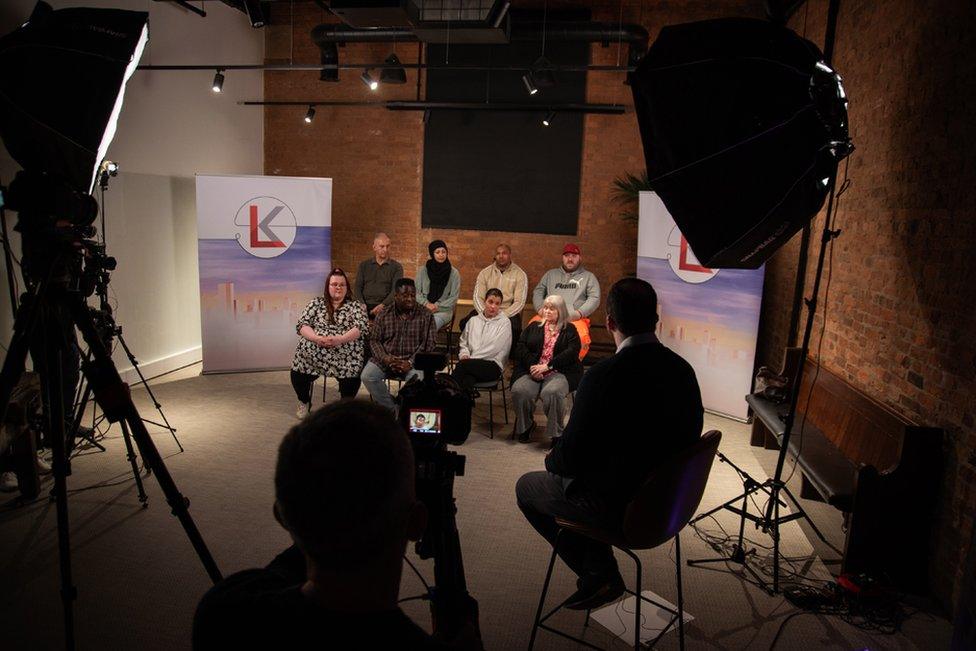
Our discussions make make grim viewing for party leaders.
But in more than 20 years of covering politics I have never sensed such a lack of belief in all our politicians' ability to solve the country's problems.
The public has always enjoyed being rude about politicians. They've always been rightly sceptical.
There was no "good old days" when the public completely trusted political geniuses.
There was: anger around the Iraq War; despair during the credit crunch; disbelief over the expenses scandal; division during the Brexit years; public pain during the pandemic; fury over Partygate and horror at the market meltdown under Liz Truss.
Politics has theoretically returned to a kind of normal after all that - with two fairly conventional party leaders.
What seems new is a sense our politics and politicians are dwarfed by the size of the country's problems, according to our Britain in a Room study.
Before persuading voters to back them, politicians may have to prove to the country they can make a difference at all.
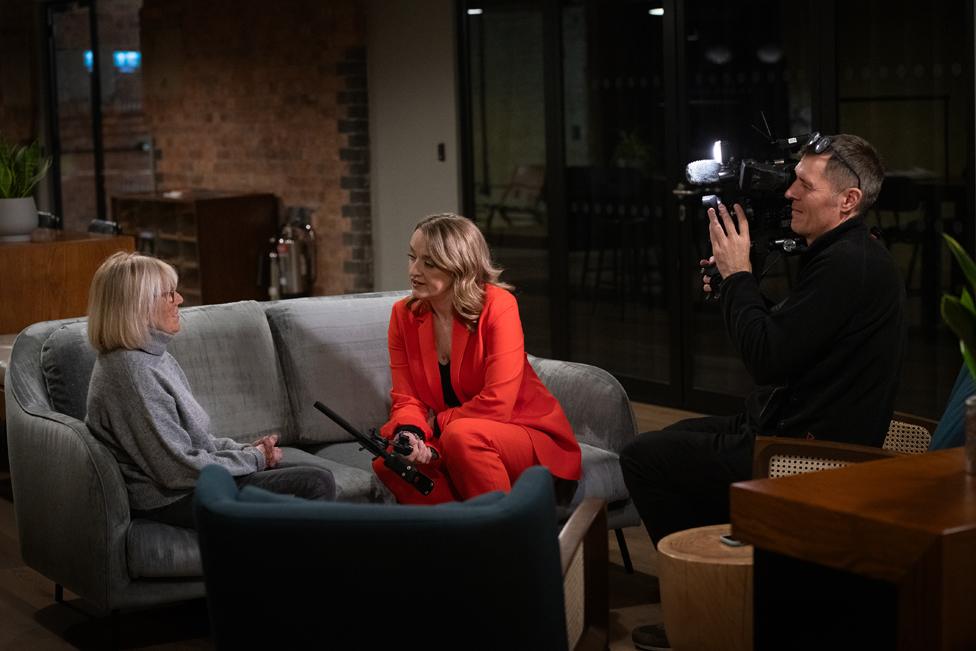
Tune in on Sunday to hear more of what Britain in a Room think
Photos: Emma Lynch/BBC

What questions would you like to ask Business Secretary Kemi Badenoch and Labour's shadow business secretary Jonathan Reynolds this Sunday?
In some cases your question will be published, displaying your name, age and location as you provide it, unless you state otherwise. Your contact details will never be published. Please ensure you have read our terms & conditions and privacy policy.
Use this form to ask your question:
If you are reading this page and can't see the form you will need to visit the mobile version of the BBC website to submit your question or send them via email to YourQuestions@bbc.co.uk, external. Please include your name, age and location with any question you send in.
Related topics
- Published25 January 2024
- Published11 April 2022
